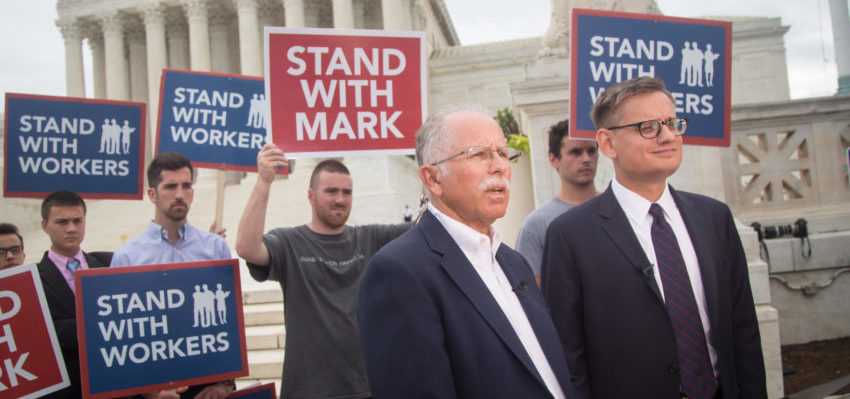 If the plaintiffs are successful, the lawsuit could open the door to a potential flood of litigation demanding unions reimburse workers for the dues labor organizations have grabbed over the past four decades. #wiright #wipolitics Click To Tweet
If the plaintiffs are successful, the lawsuit could open the door to a potential flood of litigation demanding unions reimburse workers for the dues labor organizations have grabbed over the past four decades. #wiright #wipolitics Click To Tweet
MacIver News Service | July 12, 2018
By M.D. Kittle
MADISON – In last month’s ground-shaking U.S. Supreme Court ruling restoring worker freedom to millions of public employees, Justice Samuel A. Alito Jr. crystalized why compulsory union dues have long been antithetical to the First Amendment.
Public-sector unions have done a lot of compelling for a long time – to the tune of billions of dollars. Soon, they could have to pay at least some of that money back.
“Forcing free and independent individuals to endorse ideas they find objectionable raises serious First Amendment concerns,” Alito wrote in the 5-4 majority opinion. “That includes compelling a person to subsidize the speech of other private speakers.”
Public-sector unions have done a lot of compelling for a long time – to the tune of billions of dollars. Soon, they could have to pay at least some of that money back.
The high court’s decision in Janus v. AFSCME ended 41 years of public-sector unions compelling nonunion members to contribute a portion of their paychecks to unions, ultimately as a condition of their employment.
Separately, in Riffey v. Rauner, the Supreme Court asked the 7th Circuit Court of Appeals to reconsider the case in the shadow of Janus. The ruling followed on the heels of Janus.
The National Right to Work Legal Defense Foundation, which represented Illinois state child support services employee Mark Janus in the landmark case, also represents a group of Illinois home care providers in Riffey. The case seeks the return of more than $32 million in fees “seized by” Service Employees International Union officials, according to the foundation.
If the plaintiffs are successful, the lawsuit could open the door to a potential flood of litigation demanding unions reimburse workers for the dues labor organizations have grabbed over the past four decades. As of early this month, eight such class action lawsuits were pending.
The lawsuit could open the door to a flood of litigation demanding unions reimburse workers for the dues labor organizations have grabbed over the past four decades.
“They (The Supreme Court) have granted, vacated and remanded that case back to the Seventh Circuit, which means under the Alito decision there will be monetary remuneration for those people,” Mark Mix, president of the Right to Work Foundation, recently told MacIver News Service on the Dan Conry Show, on NewsTalk 1310 WIBA. “Now, how far back that goes is another question.”
As Mix noted, Riffey v. Rauner is a continuation of the foundation’s 2014 victory before the Supreme Court in the landmark Harris v. Quinn case. In that legal battle, the court ruled that compulsory dues imposed by the state of Illinois on 80,000 individual home care providers also violated the First Amendment. The state had declared the workers unionized and required them to pay union fees.
“With the Supreme Court remanding Riffey, we are one step closer toward vindicating the rights of the tens of thousands of victims, many whom are family members caring for disabled children in their own homes,” Mix said in a statement.
But Mix knows it’s a long road to damages. The foundation in recent months filed a motion seeking relief for private sector workers in a case the workers won 30 years ago.
The foundation has established a task force to defend government employees now protected under the Supreme Court’s ruling in Janus.